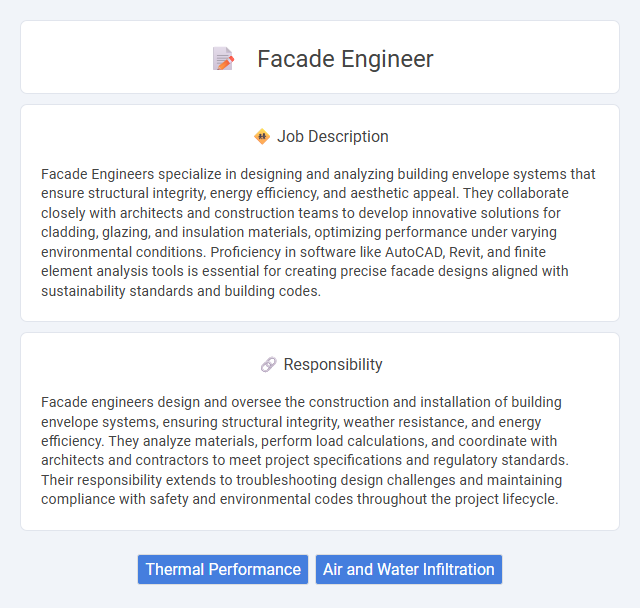
Facade Engineers specialize in designing and analyzing building envelope systems that ensure structural integrity, energy efficiency, and aesthetic appeal. They collaborate closely with architects and construction teams to develop innovative solutions for cladding, glazing, and insulation materials, optimizing performance under varying environmental conditions. Proficiency in software like AutoCAD, Revit, and finite element analysis tools is essential for creating precise facade designs aligned with sustainability standards and building codes.
Individuals with strong analytical skills and attention to detail are likely suitable for a Facade Engineer role, as the job demands precise evaluation of building exteriors and materials. Those who thrive in collaborative environments and have a solid understanding of structural engineering principles may find success in this position. Candidates lacking technical aptitude or an interest in architectural design might face challenges in meeting the role's requirements effectively.
Qualification
A Facade Engineer requires a strong background in civil or structural engineering, typically holding a bachelor's or master's degree in these fields. Proficiency in software such as AutoCAD, Revit, and BIM is essential to design and analyze complex building envelopes. Experience with materials like glass, aluminum, and steel, combined with knowledge of thermal performance, waterproofing, and structural integrity standards, is critical for ensuring safe and efficient facade systems.
Responsibility
Facade engineers design and oversee the construction and installation of building envelope systems, ensuring structural integrity, weather resistance, and energy efficiency. They analyze materials, perform load calculations, and coordinate with architects and contractors to meet project specifications and regulatory standards. Their responsibility extends to troubleshooting design challenges and maintaining compliance with safety and environmental codes throughout the project lifecycle.
Benefit
Working as a Facade Engineer likely offers the benefit of involvement in cutting-edge architectural projects, enhancing expertise in both aesthetics and structural integrity. The role may provide opportunities for collaboration with multidisciplinary teams, increasing professional growth and networking potential. Salary and job stability are probable advantages due to the specialized nature of facade engineering in the construction industry.
Challenge
Facade engineering likely presents significant challenges related to balancing aesthetic design with structural integrity and environmental performance. Professionals in this field probably face complex problem-solving scenarios involving materials, climate conditions, and building codes. The role often requires innovative thinking to overcome technical difficulties while ensuring safety and sustainability.
Career Advancement
Facade engineers specializing in designing and analyzing building envelopes play a critical role in sustainable architecture and modern construction projects. Opportunities for career advancement include progressing to senior engineer, project manager, or facade consultant positions, often requiring expertise in advanced materials, software modeling, and building regulations. Networking with architects, contractors, and interdisciplinary teams enhances prospects for leadership roles and involvement in high-profile, innovative projects.
Key Terms
Thermal Performance
Facade engineers specializing in thermal performance design building envelopes to optimize energy efficiency, reduce heat transfer, and maintain indoor comfort. They analyze materials, insulation, glazing, and ventilation systems to minimize thermal bridging and enhance U-value ratings. Applying simulation tools and building codes ensures sustainable facades that meet regulatory standards and improve overall building performance.
Air and Water Infiltration
Facade engineers specialize in designing and analyzing building envelopes to prevent air and water infiltration, ensuring energy efficiency and structural integrity. They apply advanced modeling techniques and conduct rigorous testing to identify potential leakage points and develop effective sealing solutions. Expertise in materials science and building codes allows facade engineers to optimize facade systems against environmental factors, reducing maintenance costs and enhancing occupant comfort.
 kuljobs.com
kuljobs.com